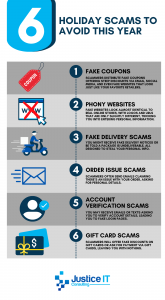It’s Open Season for Shopping Scams
October is here, and with it, the countdown to Cyber Monday—the year's biggest online shopping day. Unfortunately, it’s also prime time for cybercriminals to strike. According to the Federal Trade Commission, shopping scams were the second-worst type of scam in the U.S. in 2023.
Even worse, online scams skyrocket during the holiday season. According to TransUnion’s 2022 Global Digital Fraud Trends report, there was a 127% increase in daily fraud attempts between November 24 and 28 compared to the rest of the year.
Why are scams so common during this time? The high volume of shopping activity during the holiday season creates more opportunities for cybercriminals. Shoppers also tend to take more risks in pursuit of the best deals. Norton’s 2022 Cyber Safety Insights Report found that nearly one in three adults worldwide (32%) admitted to taking more risks with online shopping closer to the holidays.
Last-minute shopping pressure and excitement can lead to costly mistakes like clicking on unverified links, using public WiFi for transactions, and ignoring website security red flags.
Cybercriminals are counting on these mistakes. To help you stay safe, we’ve outlined six common scams that ramp up during Black Friday and Cyber Monday—and how you can avoid falling victim.
6 Common Scams During Black Friday and Cyber Monday (And How to Avoid Them)
1. Fake Coupons
Scammers often distribute fake coupons that promise steep discounts. These coupons are commonly shared via email, social media, or fake websites mimicking legitimate retailers.
How To Avoid:
- Verify coupons by checking the retailer’s official website or app.
- Avoid clicking on links in unsolicited emails, as they may lead to phishing sites.
2. Phony Websites
To steal your personal information, scammers create fake websites designed to look like popular online stores. These websites often feature similar logos, branding, and URLs that are only slightly different from the official sites.
How To Avoid:
- Always check for secure website indicators such as HTTPS and the padlock icon in the address bar.
- Read reviews and perform a quick search to verify the legitimacy of the website before making any purchases.
- Pay close attention to the URL for any unusual characters or misspellings.
3. Fake Delivery and Nondelivery Scams
Scammers send fake delivery notifications or claim a package is undeliverable to trick you into providing personal information.
How To Avoid:
- Track orders directly through the retailer’s official website or app.
- Be cautious of unsolicited delivery notifications and avoid clicking on links in suspicious messages.
4. Fake “Order Issue” Scams
These scams involve emails claiming there’s a problem with your order and asking you to provide personal details to resolve the issue. The emails often look like they come from well-known retailers.
How To Avoid:
- Contact customer service directly through the retailer’s official channels to verify any issues.
- Avoid providing personal details through links in unsolicited emails.
5. Account Verification Scams
Scammers will send fake emails or texts asking you to verify your account information. These messages usually contain links to fake login pages designed to steal your credentials.
How To Avoid:
- Never provide personal details through links in unsolicited messages.
- Instead, log in directly to your account through the retailer’s official website.
6. Gift Card Scams
Scammers may offer discounted gift cards or request payment through gift cards. Once the scammer has the card numbers, they drain the balance, leaving you with a worthless gift card.
How To Avoid:
- Purchase gift cards directly from reputable retailers.
- Never use gift cards as a form of payment to unknown individuals.
Avoid Scams and Create a Safer Shopping Experience
Nothing ruins the holiday shopping spirit like $1,000 worth of fraudulent charges on your credit card or gifts from phony websites that never arrive. Cybercriminals take advantage of the festive shopping rush, and the tendency for consumers to take more risks during this time only amplifies the danger.
By verifying sources, checking website security, and avoiding unsolicited links, you can enjoy a safer shopping experience this season!
Want More Tips on Cybersecurity?
Call to Action:
Want to stay ahead of cybercriminals this holiday season? Sign up for our FREE weekly cybersecurity tips by clicking here.




